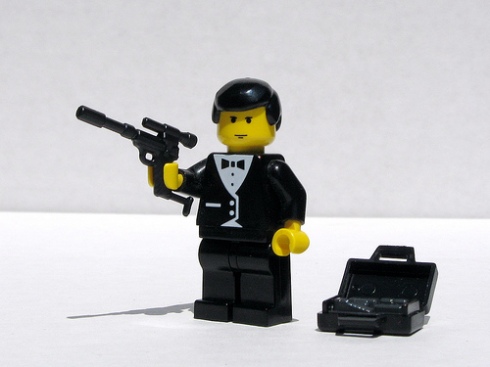
Would you speak to this man? credit:Flickr/Dunechaser
In some ways this blog is a bit off topic – it was written in slightly longer more politicised form for a different project, but I think it brings up some interesting ideas about how controlled journalism’s relationship with MI5 is. It is especially pertinent when you consider that news is being heavily dissemintated and is no longer based solely in traditonal news orgnanisations and yet it is only a single person belonging to each influential newspaper or TV channel that is able to have any access to the entire MI5 operation.
It’s hard to argue that a state, particularly a post 9/11 state, does not need a secret intelligence service. And as long as the state itself is legitimate and democratic this required secrecy seems broadly acceptable. Since the greater openness forced on the MI5 by the European legal rulings culminating in the Security Service Act of 1989 and its adoption of the lead role in counter-terrorism since the Irish Troubles of the 1970s, the organisation has cultivated a benign and trustworthy public face, an image which is rarely challenged by politicians or the media.
But as Bernard Porter argues, the concept of a British secret service has not always been so acceptable – espionage, for much of the nineteenth century, was thought to be a low, foreign practice that was abhorred by the British in part because of its tactics of immoral deception and in part because the state could not always be relied on not to abuse it.
These arguments still ring true today. Espionage is not a universally constructive; often it is counter-productive as the practice itself is often claimed as a cause of war. Domestic surveillance too has moral ambiguities. Secrecy has led to past abuses like the surveillance of Labour MP Harriet Harman – how many other misuses of power are internally justified on this basis?
Journalists, therefore, have a fraught relationship with MI5. There is no press office or cheery PR manager to answer a journalist’s query, the identities of its employees are, by nature, a well protected secret and the public face of the organisation – its head Jonathan Evans – strategically micro-manages his contact with the media to ensure it remains on his terms.
Contact is maintained through a single journalist from each publication who is given a card with a number, an untraceable email and a name. For the vast majority of newspapers this single contact is their only keyhole into MI5. An invaluable source of official information and confirmation, the source provides the media with a rare opportunity to hold a powerful and secretive organisation to some semblance of account in the stories that spring from these meetings.
However, it is also a source that must be kept at arms length. The challenge is to produce decent, serious journalism about the MI5 on the basis of one heavily vetted completely un-attributable source. It is impossible for colleagues or rivals to critique the basis of the reporter’s argument as exclusive access is granted only to the chosen few. Meanwhile, no one within in MI5 is held accountable for the claims that they make. And as the claims they make can have some dangerous repercussions there is an argument for such influential and unanswerable be kept out of the press.
Cronyism and over familiarity is a real risk to journalistic integrity in situations such as this when one journalist is to be trusted and favoured above all others. If journalists only speak to one source how can their judgement is naturally clouded by their personal impressions of that person, and if those meetings are held in secret. Away from the prying eyes of their colleagues there is little motive for impartial interviews to be conducted.
And yet it is hard to imagine it being run any other way. It’s not MI5’s raison d’etre to be open and accountable. They are there for “the protection of national security and, in particular, its protection against threats from espionage, terrorism and sabotage.” And despite the fact that our taxes pay their wages, MI5 agents do put their lives on the line when infiltrating dangerous terrorist organisations and secrecy is one of their most powerful weapons. Understandably it is not something they will be willing to give up in the name of journalistic integrity.
Journalism’s relationship with MI5 is not ideal; the power balance is dangerously in favour of the secrecy demands of the service. However, it falls to the individual journalist, and their editor, to maintain integrity and make the appropriate checks on the information they choose to use.
